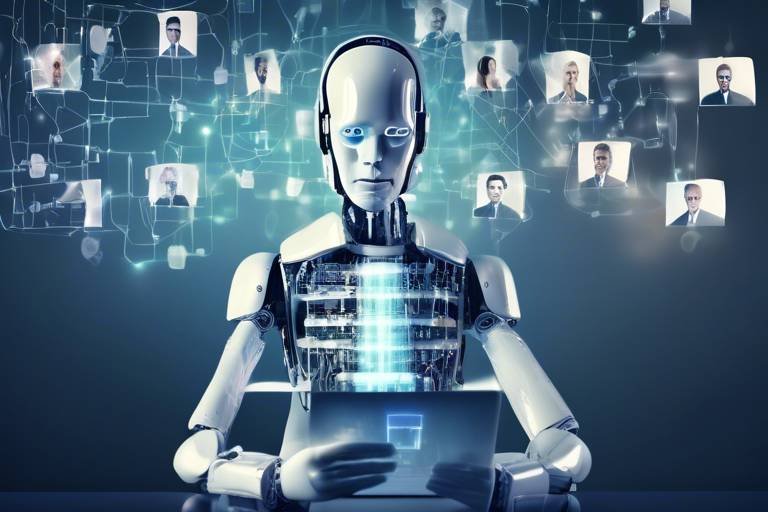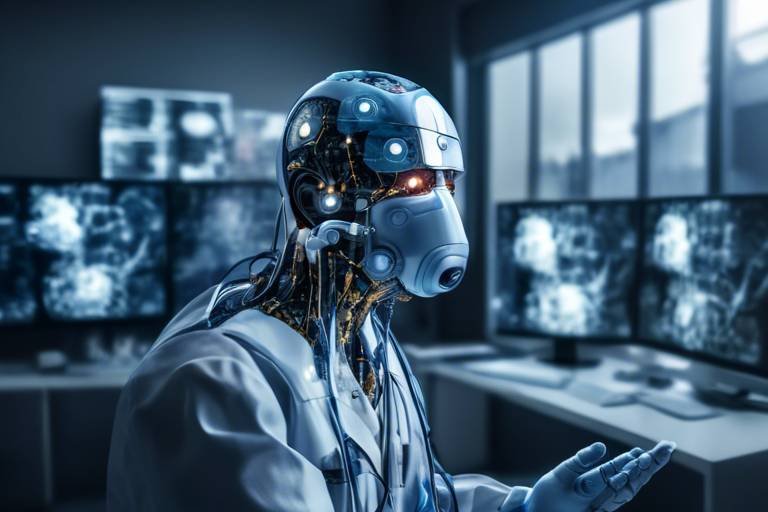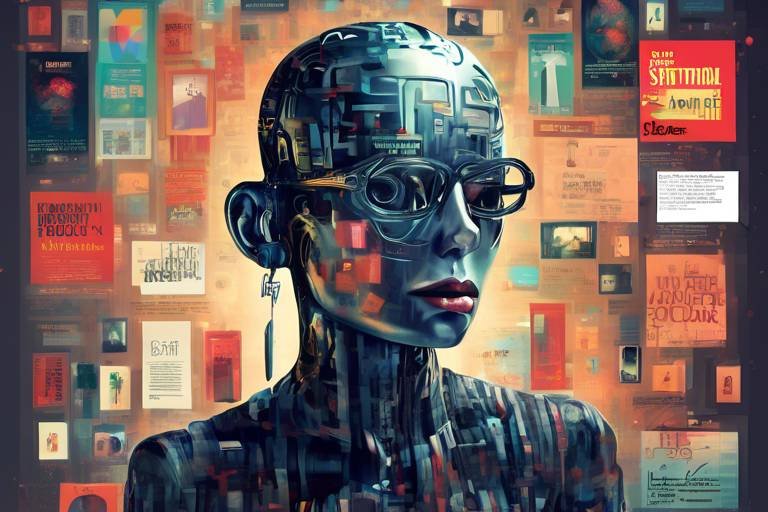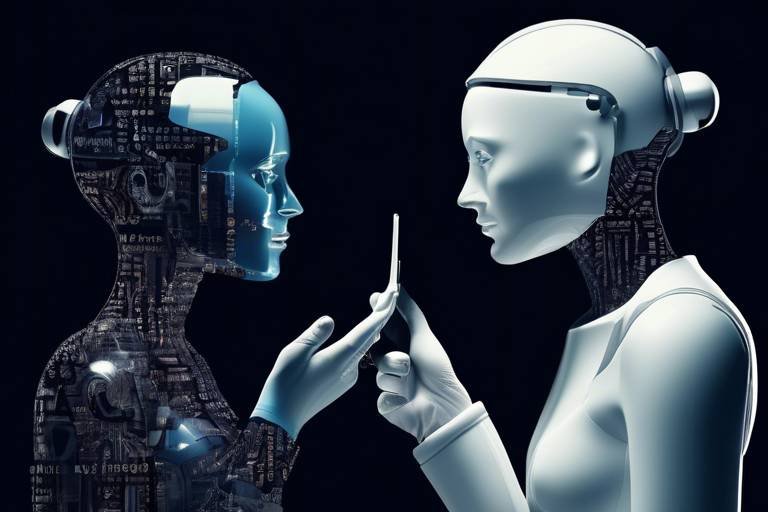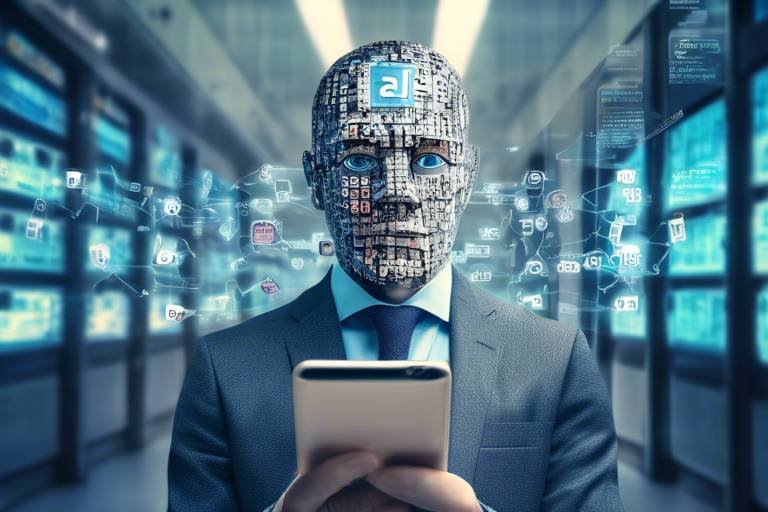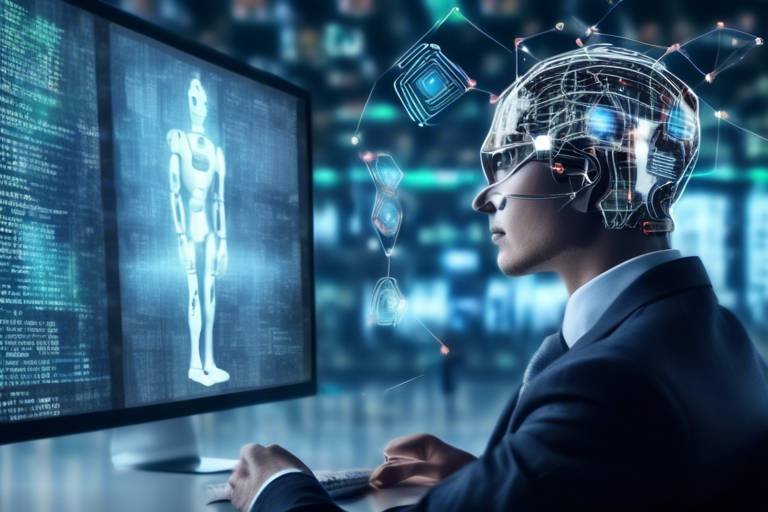How AI is Changing Human Resources
In today's fast-paced world, the integration of artificial intelligence (AI) into various fields is not just a trend; it's a revolution. The realm of Human Resources (HR) is no exception. With the rapid advancements in technology, AI is reshaping how organizations manage their most valuable asset—their people. This transformation is not merely about replacing human effort with machines; it's about enhancing the overall experience for both employees and employers. Imagine a workplace where hiring is faster, onboarding is personalized, and employee engagement is data-driven. Sounds like a dream, right? Well, it's becoming a reality!
As we delve deeper into this topic, we'll explore the multifaceted impact of AI on HR, highlighting the key areas where it is making a significant difference. From recruitment to employee engagement, AI is proving to be a game-changer. But it's not all sunshine and rainbows; there are challenges and ethical considerations that come into play as well. So, buckle up as we take you through this exciting journey of how AI is transforming HR!
AI is revolutionizing recruitment processes by streamlining candidate sourcing, improving resume screening, and enhancing the overall selection process. Imagine a world where HR professionals no longer have to sift through hundreds of resumes manually. With AI-powered tools, this tedious task becomes a breeze. These tools can quickly analyze resumes, identifying the best candidates based on specific criteria, which ultimately leads to more efficient hiring practices and better candidate experiences.
Moreover, AI can help in sourcing candidates through various platforms, ensuring a diverse pool of applicants. This not only saves time but also promotes a more inclusive hiring process. By utilizing predictive analytics, AI can even forecast which candidates are likely to succeed in a given role, making the selection process smarter and more data-driven.
Once the right candidates are selected, the next challenge is onboarding. Traditional onboarding processes can often feel overwhelming and impersonal. However, with AI, organizations can create personalized onboarding experiences for new hires. Imagine receiving a tailored training program that aligns perfectly with your role and career aspirations. AI ensures that new employees receive relevant information and training, ultimately increasing retention and job satisfaction.
This personalization not only helps new hires acclimate faster but also fosters a sense of belonging from day one. By analyzing data from previous onboarding experiences, AI can suggest the best practices and materials that resonate with different types of learners, ensuring a smoother transition into the company culture.
Performance management is another area where AI is making waves. Traditional performance reviews often occur once or twice a year, which can lead to outdated feedback and missed opportunities for growth. AI tools enable continuous performance monitoring and feedback, allowing HR professionals to identify high performers and areas needing improvement in real-time.
This fosters a culture of growth and development within organizations. With AI, employees can receive instant feedback on their performance, empowering them to make necessary adjustments promptly. This shift from annual reviews to ongoing feedback not only enhances employee engagement but also drives overall productivity.
Employee engagement is crucial for retention, and AI-driven analytics help HR teams understand employee sentiment like never before. By analyzing data from surveys, feedback, and employee interactions, AI can predict turnover and highlight potential issues before they escalate. Imagine being able to address employee concerns proactively rather than reactively!
With these insights, HR teams can implement targeted engagement strategies, ultimately enhancing workplace culture and reducing attrition rates. This data-driven approach not only benefits employees but also contributes to a more positive organizational environment.
In an era where continuous learning is essential, AI facilitates personalized learning experiences by analyzing employee skills and career goals. Organizations can provide relevant training programs that align with individual and organizational needs. This tailored approach ensures that employees are not only equipped with the necessary skills but are also motivated to grow within the company.
By leveraging AI, companies can identify skill gaps and recommend training sessions, workshops, or online courses that fit each employee's unique career path. This not only boosts employee morale but also enhances the organization's overall competency and competitiveness.
As AI becomes more integrated into HR processes, addressing ethical concerns and potential biases in algorithms is crucial. While AI can significantly improve efficiency and decision-making, it is essential to ensure fair treatment and diversity in hiring and employee management. Organizations must be vigilant in monitoring AI systems to prevent any form of discrimination.
By establishing guidelines and regularly auditing AI tools, companies can create a more equitable workplace. It's all about balancing the benefits of AI with the responsibility of ethical practices.
The future of AI in HR is promising, with advancements in machine learning and natural language processing expected to further enhance talent acquisition, employee experience, and overall organizational effectiveness. As technology continues to evolve, HR professionals will need to adapt and embrace these changes to stay competitive in the market.
With the potential to analyze vast amounts of data and provide actionable insights, the role of AI in HR is set to expand even further. The possibilities are endless, and organizations that leverage these advancements will undoubtedly reap the benefits.
Despite its benefits, integrating AI into HR systems poses challenges. Data privacy concerns, resistance to change, and the need for upskilling HR professionals to work alongside AI technologies are just a few hurdles organizations must overcome. It’s crucial for companies to address these challenges head-on to ensure a successful transition into the AI-driven future.
Examining real-world examples of organizations successfully implementing AI in their HR practices provides valuable insights into best practices, lessons learned, and the tangible benefits of this technological transformation. By learning from others, companies can avoid common pitfalls and maximize the potential of AI in their HR strategies.
- What are the main benefits of using AI in HR?
AI enhances efficiency, improves candidate sourcing, personalizes onboarding, and provides data-driven insights for employee engagement and retention. - How does AI help in reducing bias during recruitment?
AI tools can analyze large datasets to identify patterns and ensure a more diverse candidate pool, reducing human biases in the hiring process. - Are there ethical concerns related to AI in HR?
Yes, issues such as data privacy, algorithmic bias, and the need for transparency are critical considerations when implementing AI in HR. - What skills do HR professionals need to work with AI?
HR professionals should focus on developing skills in data analysis, understanding AI tools, and fostering a culture of adaptability and continuous learning.

The Role of AI in Recruitment
AI is revolutionizing the recruitment landscape in ways that were previously unimaginable. Imagine a world where the tedious hours spent sifting through countless resumes are drastically reduced, allowing HR professionals to focus on what truly matters: connecting with potential talent. The integration of AI into recruitment processes is not just a trend; it’s a game-changer that enhances efficiency and improves the overall candidate experience.
One of the most significant advancements AI brings to the table is candidate sourcing. Traditional recruitment methods often involve manual searches across multiple platforms, which can be time-consuming and prone to human error. AI tools, however, can automate this process by scanning vast databases and identifying candidates who match the job requirements in a fraction of the time. This means that recruiters can spend less time on administrative tasks and more time engaging with candidates who are the right fit for the organization.
Furthermore, AI enhances the resume screening process. Instead of relying on a subjective review of resumes, AI algorithms can analyze qualifications, skills, and experiences in a systematic way. This not only speeds up the selection process but also helps to eliminate unconscious bias. By focusing on data-driven insights, organizations can ensure they are considering a diverse pool of candidates, which is essential in today’s inclusive workplace.
In addition to sourcing and screening, AI significantly improves the overall selection process. Tools powered by AI can conduct initial interviews through chatbots, assessing candidates’ responses in real-time. This not only streamlines the process but also provides candidates with immediate feedback, enhancing their experience. Imagine applying for a job and receiving instant responses; it’s a refreshing change that candidates appreciate.
To illustrate the impact of AI on recruitment, let’s take a look at a few key benefits:
- Efficiency: AI speeds up the hiring process, allowing companies to fill positions faster.
- Quality of Hire: By using data-driven insights, organizations can select candidates who are more likely to thrive in their roles.
- Candidate Experience: Enhanced communication and quicker responses lead to a more positive experience for applicants.
However, while AI offers numerous advantages, it's crucial to remember that it should complement, not replace, the human touch in recruitment. The best outcomes arise when AI and human intuition work hand in hand. Recruiters bring empathy, understanding, and personal connection to the table—qualities that AI simply cannot replicate. Therefore, organizations should strive for a balanced approach that leverages AI’s strengths while retaining the invaluable human element in recruitment.
As we look to the future, it’s clear that AI will continue to play an essential role in shaping recruitment strategies. Organizations that embrace these technologies will not only improve their hiring processes but also position themselves as leaders in attracting top talent. The recruitment landscape is changing, and those who adapt will thrive.
- How does AI improve the recruitment process? AI streamlines candidate sourcing, enhances resume screening, and automates initial interviews, making the hiring process more efficient.
- Can AI eliminate bias in recruitment? While AI can help reduce unconscious bias by focusing on data-driven insights, it’s essential to continuously monitor and adjust algorithms to ensure fairness.
- Is AI a replacement for human recruiters? No, AI should complement human recruiters, providing them with tools to enhance their decision-making and improve candidate interactions.
- What are the potential downsides of using AI in recruitment? Potential downsides include reliance on algorithms that may not fully capture human qualities and the need for ongoing oversight to prevent biases in AI systems.

AI-Powered Employee Onboarding
In today’s fast-paced business landscape, the onboarding process has evolved significantly, and at the forefront of this transformation is artificial intelligence (AI). Gone are the days when new hires were left to navigate their first few weeks with little guidance and overwhelming amounts of paperwork. Now, AI is stepping in to create a more engaging and personalized onboarding experience that not only welcomes new employees but also sets them up for long-term success.
Imagine walking into your new office and being greeted by a friendly AI assistant that knows your name, your role, and even your training schedule. This is not just a futuristic dream; it's the reality for many organizations leveraging AI technology. By utilizing AI-powered platforms, companies can tailor onboarding programs to fit the specific needs of each employee. This means that whether you’re a fresh graduate or a seasoned professional, your onboarding experience can be customized to address your unique background and skill set.
One of the most significant advantages of AI in onboarding is its ability to analyze data from various sources. For instance, AI can assess an employee's previous experience, educational background, and even their learning style. With this information, organizations can curate content that resonates with the new hire, making the onboarding process not only more efficient but also more enjoyable. This personalized approach helps to bridge the gap between the old and new work cultures, ensuring that new employees feel integrated from day one.
Furthermore, AI can streamline administrative tasks that often bog down the onboarding process. With automated systems in place, new hires can complete essential paperwork digitally, reducing the need for tedious manual entry and allowing HR professionals to focus on more strategic initiatives. This not only enhances the efficiency of the onboarding process but also improves the overall experience for new employees, who can spend more time engaging with their teams and less time buried in forms.
However, the impact of AI on onboarding goes beyond just efficiency. It also plays a crucial role in enhancing employee engagement. By incorporating interactive elements such as chatbots and virtual reality training sessions, organizations can create an immersive onboarding experience. For example, a chatbot can provide instant answers to common questions, while virtual reality can simulate real-life scenarios that employees may encounter in their roles. This innovative approach not only makes the onboarding process more engaging but also helps to build a strong connection between new hires and their workplace culture.
To illustrate the effectiveness of AI-powered onboarding, consider the following table that compares traditional onboarding practices with AI-enhanced methods:
| Aspect | Traditional Onboarding | AI-Powered Onboarding |
|---|---|---|
| Customization | Generic training materials | Personalized learning paths |
| Engagement | Static presentations | Interactive experiences |
| Administrative Efficiency | Manual paperwork | Automated document processing |
| Feedback | Limited follow-up | Continuous feedback loops |
As organizations continue to embrace AI technologies, the future of onboarding looks incredibly promising. By fostering a more personalized and engaging experience, companies can not only improve retention rates but also enhance overall job satisfaction among new hires. In a world where the employee experience is paramount, AI-powered onboarding is not just an option; it’s becoming a necessity for businesses aiming to attract and retain top talent.
- How does AI improve employee onboarding? AI enhances onboarding by personalizing the experience, automating administrative tasks, and providing interactive elements that engage new hires.
- What tools are commonly used for AI-powered onboarding? Common tools include chatbots, virtual reality training programs, and AI-driven learning management systems.
- Can AI help with employee retention during onboarding? Yes, by creating a more engaging and tailored onboarding experience, AI can significantly improve employee retention rates.

Performance Management Enhancements
In today's fast-paced work environment, where every second counts, performance management has evolved from a once-a-year evaluation to a continuous, dynamic process that thrives on real-time feedback and data-driven insights. This shift is largely thanks to the integration of artificial intelligence (AI) technologies, which are proving to be game-changers in how organizations monitor and enhance employee performance.
Imagine having a personal coach who not only tracks your progress but also offers tailored advice based on your unique strengths and weaknesses. That's what AI brings to the table for HR professionals. With AI tools, companies can continuously monitor employee performance, providing feedback that is timely and relevant. This means no more waiting for the annual review to find out how you're doing; instead, employees receive ongoing insights that help them grow and improve in real time.
AI can analyze vast amounts of data from various sources, including project management tools, communication platforms, and employee surveys. By doing so, it identifies patterns and trends that might go unnoticed by human eyes. For example, if an employee consistently excels in collaborative tasks but struggles with individual assignments, AI can flag this and prompt discussions between the employee and their manager to address these challenges. This proactive approach fosters a culture of growth and development, where employees feel supported and empowered to reach their full potential.
Moreover, AI-driven performance management systems can help HR professionals identify high performers and those who might need additional support. By leveraging predictive analytics, organizations can forecast performance trends and even predict potential turnover. This capability allows companies to take action before issues escalate, ensuring that top talent remains engaged and satisfied in their roles.
However, the implementation of AI in performance management is not without its challenges. One of the key concerns is the potential for bias in the algorithms used to evaluate employee performance. It's essential for organizations to regularly audit these systems to ensure they are fair and equitable. Additionally, employees may feel uneasy about being monitored constantly, so it's crucial to foster an open dialogue about how AI is used and the benefits it brings.
In conclusion, AI is reshaping the landscape of performance management by enabling organizations to adopt a more personalized, data-driven approach. By providing continuous feedback and insights, AI not only helps employees enhance their skills but also contributes to a more engaged and productive workforce. As we move forward, embracing these technologies will be vital for organizations aiming to stay competitive in an ever-evolving market.
- How does AI improve performance management? AI enhances performance management by providing real-time feedback, identifying trends, and offering personalized insights that help employees grow.
- What are the risks associated with AI in performance management? Risks include potential biases in algorithms and employee concerns about constant monitoring.
- Can AI predict employee turnover? Yes, AI can analyze performance data and employee engagement levels to forecast potential turnover.
- How can organizations ensure fair use of AI in performance evaluations? Regular audits of AI systems and transparent communication with employees can help ensure fairness.

Employee Engagement and Retention
In today's fast-paced corporate world, employee engagement and retention have become pivotal for organizations aiming to thrive. With the advent of artificial intelligence, HR teams are now equipped with powerful tools that can significantly enhance their understanding of employee sentiments and behaviors. Imagine having a crystal ball that not only predicts when an employee might leave but also provides insights into how to keep them happy and engaged! This is precisely what AI brings to the table.
AI-driven analytics can sift through vast amounts of data to uncover patterns and trends that human analysts might miss. For instance, by analyzing employee feedback, performance metrics, and even social media interactions, AI can help HR professionals gauge the overall sentiment within the organization. This insight is invaluable; it allows HR teams to proactively address issues before they escalate into larger problems that might lead to turnover.
Moreover, AI can help in developing targeted engagement strategies. For example, it can identify employees who may be feeling disengaged based on their activity levels, feedback scores, or even changes in their work habits. By pinpointing these individuals, organizations can implement tailored interventions, such as personalized development programs, mentorship opportunities, or even simple check-ins to ensure that employees feel valued and heard.
To illustrate this further, consider the following table that outlines some common AI applications in enhancing employee engagement:
| AI Application | Description | Benefits |
|---|---|---|
| Sentiment Analysis | Analyzing employee feedback and communication for mood and engagement levels. | Identifies disengaged employees and helps in crafting targeted retention strategies. |
| Predictive Analytics | Using historical data to predict turnover risks. | Enables proactive measures to retain top talent before they decide to leave. |
| Personalized Learning | Creating customized training programs based on individual employee needs. | Enhances skill development and increases job satisfaction. |
Furthermore, engaging employees is not just about keeping them from leaving; it’s about fostering a culture where they feel empowered and motivated to contribute their best work. AI can facilitate this by providing insights into which initiatives resonate most with employees. For example, if an organization launches a new wellness program, AI can track participation rates and employee feedback to determine its effectiveness. This feedback loop enables continuous improvement, ensuring that engagement strategies evolve alongside employee needs.
However, while AI presents remarkable opportunities for enhancing employee engagement and retention, it is essential to approach its implementation thoughtfully. Organizations must ensure that the data collected is used ethically and that employees feel comfortable sharing their feedback. Transparency is key; when employees understand how their data is being used to improve their workplace experience, they are more likely to engage with the process positively.
In conclusion, leveraging AI for employee engagement and retention is not just a trend; it’s becoming a necessity in today’s competitive job market. By utilizing AI tools, organizations can gain invaluable insights into their workforce, allowing them to craft strategies that not only retain talent but also cultivate a thriving workplace culture. After all, a happy employee is a productive employee, and in the end, that’s what every organization strives for.
- How does AI improve employee engagement?
AI analyzes employee feedback and behavior to provide actionable insights that help HR create targeted engagement strategies. - Can AI predict employee turnover?
Yes, AI uses historical data and predictive analytics to identify employees at risk of leaving, allowing HR to intervene proactively. - What are the ethical considerations of using AI in HR?
Organizations must ensure data privacy and transparency, making sure employees are aware of how their data is used to improve their work experience.

Learning and Development Innovations
In today's fast-paced world, the landscape of learning and development is undergoing a significant transformation, largely thanks to the integration of artificial intelligence (AI). Organizations are beginning to realize that traditional training methods are not sufficient to meet the evolving needs of their workforce. AI is stepping in to create personalized learning experiences that resonate with employees on an individual level. Imagine a world where every employee has access to a tailored training program that aligns perfectly with their skills and career aspirations. Sounds like a dream, right? Well, with AI, that dream is becoming a reality.
One of the most impactful innovations is the use of AI-driven analytics to assess employee skills and performance. By analyzing data from various sources, AI can identify gaps in knowledge and suggest targeted training programs. This not only saves time but also ensures that employees are engaged in learning that truly matters to them. For instance, if an employee is looking to enhance their project management skills, AI can recommend specific courses or learning modules that align with their current role and future aspirations.
Furthermore, AI can facilitate adaptive learning. This means that as employees progress through their training, the AI system can adjust the difficulty level and content based on their performance. Think of it as having a personal trainer for your professional development. Just like a fitness coach who tailors workouts to your ability, AI can customize learning paths that keep employees motivated and challenged without overwhelming them.
Another exciting aspect is the use of virtual reality (VR) and augmented reality (AR)
Moreover, organizations are leveraging AI to create social learning environments. By fostering collaboration and interaction among employees, AI tools can facilitate knowledge sharing and peer-to-peer learning. Employees can engage in discussions, share resources, and even participate in group projects, making learning a communal experience. This not only enhances individual learning but also strengthens team dynamics, leading to a more cohesive workplace culture.
However, as with any innovation, there are challenges to consider. Organizations must ensure that the AI systems they implement are user-friendly and accessible to all employees. Additionally, there should be a focus on upskilling HR professionals and managers to effectively utilize these tools. After all, the goal is to enhance human capabilities, not replace them.
In conclusion, AI is revolutionizing the way organizations approach learning and development. By harnessing the power of AI, companies can create personalized, engaging, and effective training programs that not only meet the needs of their employees but also drive organizational success. The future of learning is here, and it’s smarter than ever!
- How does AI personalize learning experiences? AI analyzes employee data to identify skills gaps and recommends tailored training programs that align with individual career goals.
- What role do VR and AR play in employee training? VR and AR provide immersive learning experiences, allowing employees to practice skills in simulated environments before applying them in real-world scenarios.
- Are there any challenges in implementing AI for learning? Yes, challenges include ensuring user-friendliness of AI tools and upskilling HR professionals to effectively utilize these technologies.

AI Ethics and Bias in HR
As artificial intelligence continues to permeate various sectors, the realm of human resources is no exception. However, with great power comes great responsibility, and this is particularly true when it comes to the ethical implications of AI in HR. While AI promises efficiency and effectiveness in recruitment, onboarding, and employee management, it also raises significant concerns about bias and fairness. Imagine a world where hiring decisions are made by algorithms that might inadvertently favor one demographic over another—this is the reality we face if we don’t address these ethical challenges head-on.
One of the primary issues surrounding AI in HR is the potential for algorithmic bias. This occurs when the data used to train AI systems reflects historical prejudices or stereotypes. For instance, if an AI recruitment tool is trained on past hiring data that favored a particular gender or ethnicity, it may continue to perpetuate these biases, leading to unfair treatment of candidates. A study by the Harvard Business Review revealed that AI systems can inadvertently learn biases present in the data, which can result in discriminatory hiring practices. Therefore, it is crucial for organizations to scrutinize the data they use and ensure it is representative of diverse populations.
Moreover, transparency in AI decision-making processes is essential. Employees and candidates alike deserve to understand how decisions are made, especially when those decisions can significantly impact their careers. A lack of transparency can lead to mistrust and skepticism towards AI systems. Organizations should strive to implement explainable AI models that allow HR professionals to interpret the reasoning behind algorithmic decisions. This not only fosters trust but also empowers HR teams to make informed choices based on AI insights.
To mitigate the risks associated with AI bias, companies can adopt several best practices:
- Diverse Data Collection: Ensure that the data used to train AI systems is diverse and inclusive, reflecting a wide range of backgrounds and experiences.
- Regular Audits: Conduct regular audits of AI systems to identify and address biases that may arise over time.
- Human Oversight: Maintain human oversight in decision-making processes to ensure that AI recommendations align with organizational values and ethical standards.
Additionally, engaging in employee training programs focused on AI ethics can equip HR professionals with the knowledge to recognize and combat bias in AI systems. By fostering a culture of awareness and accountability, organizations can better navigate the complexities of AI ethics.
Ultimately, the integration of AI into HR practices presents a unique opportunity to enhance efficiency and effectiveness. However, it is imperative that organizations prioritize ethical considerations and actively work to eliminate bias. By doing so, they can create a fairer, more inclusive workplace that not only attracts top talent but also nurtures a diverse and thriving workforce.
Q: What is algorithmic bias in AI?
A: Algorithmic bias occurs when an AI system produces unfair outcomes due to biased data or flawed algorithms, often reflecting historical prejudices.
Q: How can organizations ensure ethical AI use in HR?
A: Organizations can ensure ethical AI use by collecting diverse data, conducting regular audits, and maintaining human oversight in decision-making processes.
Q: Why is transparency important in AI decision-making?
A: Transparency is crucial because it builds trust among employees and candidates, allowing them to understand how decisions affecting their careers are made.

Future Trends in AI and HR
The future of AI in Human Resources is not just an exciting prospect; it's a rapidly evolving reality that promises to reshape how organizations function. As we look ahead, several key trends are emerging that will significantly influence talent acquisition, employee experience, and overall organizational effectiveness. Imagine a world where HR professionals are equipped with advanced tools that not only streamline processes but also enhance decision-making through data-driven insights. Sounds intriguing, right? Let’s dive into some of these trends!
One of the most significant trends is the increasing use of machine learning algorithms to refine recruitment processes. These algorithms can analyze vast amounts of data to identify the best candidates based on specific criteria, making the hiring process faster and more accurate. For example, AI can sift through thousands of resumes in seconds, pinpointing those that match the job description closely. This not only saves time but also reduces the risk of human error in the initial screening stages.
Additionally, the incorporation of natural language processing (NLP) is set to revolutionize employee interactions. Imagine chatbots powered by NLP that can answer employee queries in real-time, providing instant support and guidance on HR-related issues. This technology can enhance employee engagement by ensuring that their questions are addressed promptly, leading to a more satisfied workforce.
Moreover, the future will likely see an increase in the use of predictive analytics within HR departments. By analyzing patterns in employee data, organizations can anticipate turnover rates and identify potential flight risks. This proactive approach allows HR teams to implement targeted retention strategies, ultimately fostering a more stable and engaged workforce. For instance, if predictive analytics indicate that employees in a particular department are likely to leave, HR can intervene with tailored support or incentives to enhance job satisfaction.
Another trend to watch is the rise of AI-driven personalized learning and development programs. As organizations strive to cultivate a culture of continuous learning, AI can play a pivotal role in identifying employees' skills gaps and recommending relevant training. This personalized approach not only boosts employee morale but also aligns individual growth with organizational goals. It’s like having a personal coach guiding each employee on their career journey!
However, with all these advancements, it’s crucial to remain vigilant about the ethical implications of AI in HR. Organizations must ensure that their AI systems are designed to promote diversity and inclusivity, avoiding biases that could affect hiring and employee management. As AI continues to evolve, so too must our commitment to ethical practices in its application.
In conclusion, the future of AI in HR is bright and filled with potential. From enhancing recruitment processes to fostering employee engagement and development, AI is set to become an indispensable part of HR strategies. As we embrace these changes, it’s essential to remain aware of the challenges and responsibilities that come with them, ensuring that technology serves to enhance the human experience in the workplace.
- What are the main benefits of using AI in HR? AI can streamline recruitment, personalize employee training, and enhance engagement through data-driven insights.
- How can AI help reduce bias in hiring? By implementing algorithms that are regularly audited for bias, organizations can create a fairer hiring process.
- What role does data privacy play in AI HR applications? Organizations must prioritize data privacy and compliance to protect employee information while leveraging AI technologies.
- Is AI replacing HR professionals? No, AI is designed to assist HR professionals, allowing them to focus on more strategic tasks rather than administrative ones.

Challenges of Implementing AI in HR
While the integration of artificial intelligence in human resources offers immense potential, it's not all smooth sailing. Organizations often face a multitude of challenges when trying to adopt AI technologies. One of the most pressing issues is data privacy concerns. With AI systems relying heavily on data to function effectively, ensuring that sensitive employee information is protected is paramount. The fear of data breaches or misuse can lead to hesitance in embracing these innovative tools.
Another significant hurdle is the resistance to change among HR professionals and employees alike. Many individuals are accustomed to traditional HR practices and may be skeptical about the reliability and effectiveness of AI. This skepticism can create a culture of reluctance, making it difficult to implement new technologies. It’s essential for organizations to foster an environment that encourages adaptation and learning, perhaps through workshops or training sessions that elucidate the benefits of AI.
Moreover, there’s a pressing need for upskilling HR professionals to work alongside AI technologies. As these tools become more sophisticated, HR personnel must also evolve. This means investing in training programs that equip them with the necessary skills to leverage AI effectively. Organizations must recognize that AI is not a replacement for human intuition and judgment but rather a tool that can enhance decision-making processes.
Additionally, there are concerns regarding the potential for bias in AI algorithms. If not carefully monitored, AI systems can inadvertently perpetuate existing biases present in historical data. This can lead to unfair treatment in hiring and employee management practices, undermining the very goal of diversity and inclusion that many organizations strive for. Companies must actively work to audit their AI systems to ensure fairness and transparency in their operations.
Finally, the cost of implementation can be a barrier for many organizations, especially smaller ones. Investing in AI technology, training, and ongoing maintenance can be a significant financial commitment. Therefore, it's crucial for businesses to weigh the long-term benefits against the initial costs. Below is a table summarizing some of the key challenges organizations face when implementing AI in HR:
| Challenge | Description |
|---|---|
| Data Privacy Concerns | Risk of data breaches and misuse of sensitive employee information. |
| Resistance to Change | Skepticism among HR professionals and employees about AI reliability. |
| Need for Upskilling | HR personnel must be trained to effectively use AI technologies. |
| Potential for Bias | AI algorithms may perpetuate existing biases in hiring and management. |
| Cost of Implementation | High initial investment required for technology and training. |
In conclusion, while the challenges of implementing AI in HR may seem daunting, they are not insurmountable. By addressing these issues head-on, organizations can pave the way for a more efficient and effective HR landscape, ultimately leading to enhanced employee experiences and better business outcomes.
- What are the main challenges of implementing AI in HR? The main challenges include data privacy concerns, resistance to change, the need for upskilling HR professionals, potential bias in algorithms, and the cost of implementation.
- How can organizations overcome resistance to AI? Organizations can overcome resistance by providing training, demonstrating the benefits of AI, and fostering a culture of innovation.
- Is AI replacing HR jobs? No, AI is not replacing HR jobs; rather, it is enhancing HR functions and allowing professionals to focus on more strategic tasks.

Case Studies of AI in HR
In the rapidly evolving landscape of human resources, several organizations have embraced artificial intelligence to enhance their HR practices. These case studies not only showcase the innovative use of AI but also provide valuable lessons for companies looking to integrate similar technologies. Let's dive into some notable examples.
One standout case is that of Unilever, a global consumer goods company that has revolutionized its recruitment process through AI. Unilever implemented an AI-driven platform that uses games and video interviews to assess candidates' skills and personality traits. This approach has significantly reduced the time taken to hire new employees while also improving the quality of hires. By leveraging AI, Unilever has managed to streamline its recruitment process, ensuring that it attracts the right talent faster than ever before.
Another compelling example comes from IBM, which has developed the Watson Talent platform. This AI-powered tool analyzes resumes and matches candidates to job descriptions based on various parameters, including skills, experience, and cultural fit. The results have been remarkable, with IBM reporting a decrease in the time spent on resume screening by up to 75%. This not only saves time for HR professionals but also enhances the candidate experience by ensuring that only the most suitable applicants are considered for each position.
On the employee engagement front, Salesforce has harnessed AI to monitor employee sentiment through its AI-powered analytics tool, Einstein Analytics. This tool collects feedback from various channels, including surveys and social media, to gauge employee satisfaction and engagement levels. By analyzing this data, Salesforce can proactively address issues that may lead to employee turnover, fostering a more positive workplace culture. The result? A noticeable increase in employee retention rates.
Moreover, Accenture has taken AI a step further by utilizing it for personalized learning and development. The company employs AI algorithms to assess employee skills and career aspirations, allowing it to recommend tailored training programs. This customized approach not only enhances employee satisfaction but also aligns individual growth with organizational goals. Accenture has reported significant improvements in employee performance and engagement as a result of this initiative.
However, while these case studies illustrate the potential of AI in HR, they also highlight the importance of ethical considerations. For instance, organizations must ensure that their AI systems are free from bias. A study conducted by Amazon revealed that their AI recruitment tool was biased against female candidates, leading the company to scrap the project entirely. This serves as a reminder that while AI can enhance efficiency, it is crucial to implement it responsibly.
In conclusion, the integration of AI in HR practices is not just a trend; it is a transformative shift that can lead to significant improvements in recruitment, employee engagement, and overall organizational effectiveness. By learning from these case studies, companies can navigate the complexities of AI adoption and harness its full potential.
- What are the main benefits of using AI in HR? AI can streamline recruitment processes, enhance employee engagement, and provide personalized learning experiences.
- Are there any risks associated with AI in HR? Yes, potential risks include data privacy concerns and algorithmic bias.
- How can companies ensure ethical AI practices? Companies should regularly audit their AI systems for bias and ensure transparency in their algorithms.
- What industries are most impacted by AI in HR? Industries such as technology, retail, and healthcare are significantly leveraging AI for HR processes.
Frequently Asked Questions
- How is AI transforming the recruitment process?
AI is revolutionizing recruitment by automating candidate sourcing, improving resume screening, and enhancing the selection process. This leads to faster hiring and a better experience for candidates, ensuring that the right talent is matched with the right roles.
- What benefits does AI offer for employee onboarding?
AI enables organizations to create personalized onboarding experiences tailored to new hires' roles. This ensures they receive relevant information and training, which can significantly increase retention rates and overall job satisfaction.
- How does AI improve performance management?
AI tools facilitate continuous performance monitoring and feedback, helping HR professionals identify high performers and areas needing improvement. This fosters a culture of growth and development, allowing organizations to nurture their talent effectively.
- Can AI help with employee engagement and retention?
Absolutely! AI-driven analytics provide insights into employee sentiment, predict turnover, and help HR teams implement targeted engagement strategies. This ultimately enhances workplace culture and reduces attrition rates.
- What role does AI play in learning and development?
AI analyzes employee skills and career goals to facilitate personalized learning experiences. This allows organizations to offer relevant training programs that align with both individual and organizational needs, enhancing employee growth.
- What ethical concerns are associated with AI in HR?
As AI becomes more integrated into HR processes, addressing ethical concerns and potential biases in algorithms is crucial. This ensures fair treatment and diversity in hiring and employee management practices.
- What future trends can we expect in AI and HR?
The future of AI in HR looks promising, with advancements in machine learning and natural language processing expected to further enhance talent acquisition and employee experience. This will lead to more effective organizational practices.
- What challenges might organizations face when implementing AI in HR?
Integrating AI into HR systems poses challenges such as data privacy concerns, resistance to change, and the need for upskilling HR professionals. Addressing these challenges is essential for successful AI adoption.
- Can you provide examples of successful AI implementation in HR?
Yes! Examining case studies of organizations that have successfully integrated AI into their HR practices can provide valuable insights into best practices, lessons learned, and the tangible benefits of this technological shift.

